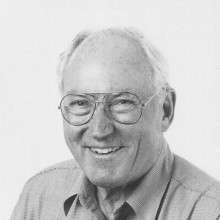




IN MEMORIAM
Professor Emeritus Dean Stoddard Worth died after a long illness on February 29, 2016 at the age of 88 in Lititz, Pennsylvania. Dr. Worth retired from UCLA in 1994 after 37 years of service in the Department of Slavic Languages and Literatures (now the Department of Slavic, East European and Eurasian Languages and Cultures). The Department and UCLA community mourn the loss of an illustrious colleague and friend.
Born in Brooklyn in 1927, Professor Worth spent most of his early life in New England, attending the Phillips Exeter Academy and Dartmouth College (B.A. 1949). He continued his study at the École nationale des langues orientales vivantes in Paris, where he was awarded his diploma in 1952, concurrently earning his Certificat d’études superieurs at the University of Paris (Sorbonne). He continued his studies under the mentorship of Roman Jakobson at Harvard University, where he received his M.A. (1953) and Ph.D. (1956) in Slavic Languages and Literatures. In 1957 he joined the faculty at UCLA, where he spent the rest of his academic career, advancing to full professorship in 1965 and overseeing the growth of the Department into one of the country’s preeminent centers of Slavic studies.
Professor Worth was best known for his scholarship in areas related to the Russian language, including its structure, history, and literary tradition, but his earliest publications also presented ground-breaking research on Kamchadal, one of the indigenous languages of northeastern Siberia. His research included some of the earliest exploration of computer-based machine translation, funded by the RAND Corporation. In addition to publishing two bibliographies authoritative in their fields, a monograph on the history of the study of the Russian language, and about two hundred scholarly articles, he also promoted colleagues’ work as editor of the International Journal of Slavic Linguistics and Poetics and through the many conferences he organized. The volumes he edited, many of them the fruit of these conferences, comprise over a dozen volumes. He also co-edited a medieval Slavic text, the Zadonshchina, together with his mentor Roman Jakobson. He was one of the earliest American scholars to visit Russia during the post-Stalin era and he promoted international scholarly exchange, both by inviting Russian visitors to his department at UCLA and into his home, and through his chairmanship of the International Committee of Slavists. He developed warm relationships especially with Czech scholars, some of whom he aided in various ways after the Soviet invasion of 1968.
He was respected by his students and won many fellowships and awards for his scholarship —from the John S. Guggenheim Memorial Foundation, the International Research and Exchanges Board, the National Science Foundation, the National Endowment for the Humanities, and others. In 1992 he received the Award for Outstanding Achievement in Scholarship from American Association for Teachers Slavic and East European Languages. His standing in his profession is also attested to by his having been offered not one, but two volumes of articles published in his honor, one by his former students. He also contributed extensively to the university and profession in an administrative and advisory capacity. In addition to serving as Slavic Department Chair for several terms, he chaired the Council on Academic Personnel and the Advisory Committee of the Center for Russian and East European Studies (now the Center for European and Russian Studies). In 1984 he was awarded the inaugural College Prize from the College of Letters and Science for outstanding achievement in teaching, research and university service. No less stellar was his service to the profession. He was a Fellow and Advisory Board member of the Kennan Center for Advanced Russian Studies (Washington, D.C) and a consultant to the Rand Corporation, the National Science Foundation, the American Council of Learned Societies and the Social Sciences Research Council. He was known for his hospitality, his resourcefulness, and his unfailing courtesy, generosity, integrity, and fairness. He loved the outdoors and enjoyed introducing foreign visitors to the wonders of the California deserts and mountains.
He is survived by his wife Emily and by his niece Christine, two nephews, Bruce and Gregory, and their spouses.